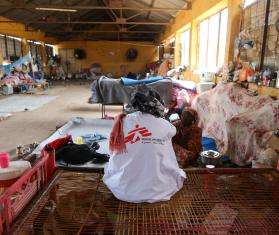In theory, the headlines bring you the "biggest" and "most important" international stories of the day. One moment, it might be Syria. The next, it could be Afghanistan. Or Ebola. Maybe Yemen, or the latest natural disaster to strike a country. Every now and then—though not that often, if we’re being honest—it might be Central African Republic or South Sudan. Usually, they have their moment and then it’s on to the next place. That’s understandable, to an extent. It’s hard to keep up with everything, and some places do exert a greater hold on our collective attention. But then we miss so much. And we forget that for so many people, the most important story is what’s happening to them wherever they are.
I saw that on my recent field assignment in Burundi, where I joined MSF teams providing emergency medical care amidst severe spasms of political violence. It didn’t matter that there were very few cameras in the country. There was no let up. It was life and death. And everybody on the ground knew it. Some would even ask, "where is everyone else?"
Questions like that are hard to answer, because I and all of us at MSF know there is so much happening on any given day that deserves attention—that needs attention. What we can do, though, is use platforms like Alert to flag some places that have faded from the headlines or rarely feature in them. Places like the Lake Chad region at the junction of Niger, Nigeria, Cameroon, and Chad, which has been wracked by deadly violence and recurring outbreaks of disease for years, largely hidden from public view. Places like Papua New Guinea, Tanzania (where Burundian refugees are seeking sanctuary), Pakistan, Haiti, and Colombia as well. Writing about them probably doesn’t mean they’ll be on the cover of your local newspaper tomorrow, but we can at least describe what’s happening on the ground and what we’re doing in response.
We also want to do this because we want to be transparent about how we utilize the funds with which donors entrust us. Talking only about “frontline” countries might help raise more money in an absolute sense, but it wouldn’t be an accurate depiction of the scope and nature of our work. So we not only want to talk about “the other places.” We need to talk about them. We need to tell you about them. Because you’re helping us do this work, and we want to be as accountable to you as we are grateful.
You can still read about all our work, in all countries, on doctorswithoutborders.org, and get regular updates through our Facebook, Instagram, Flipboard, and Twitter accounts. But I do hope you enjoy this tour of countries you may not have read much about of late. These projects—and the people they endeavor to assist—are very important to us, as they should be and as they will always be. No matter what the headlines say.
Sincerely Yours,
Deane Marchbein, MD
President, MSF-USA Board of Directors





